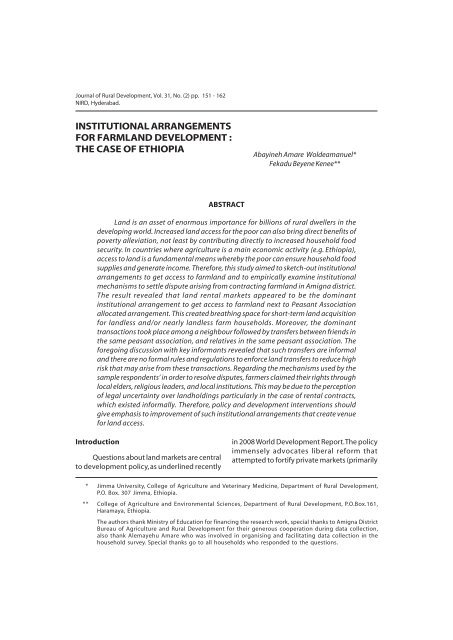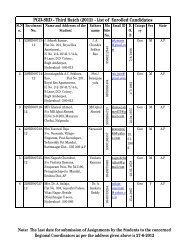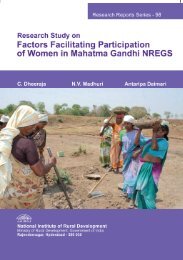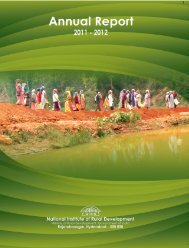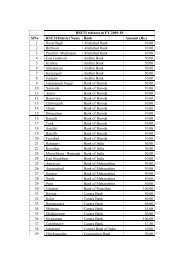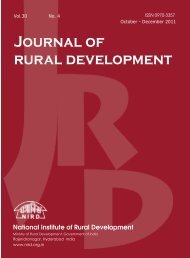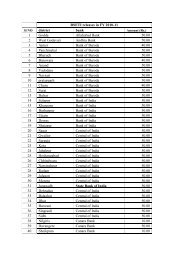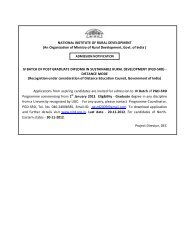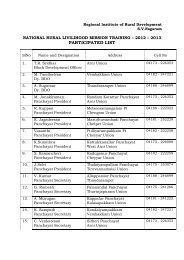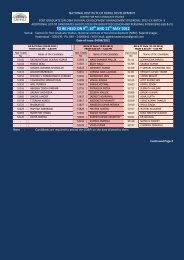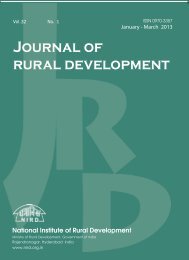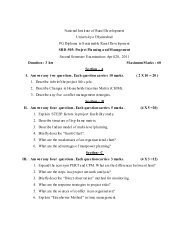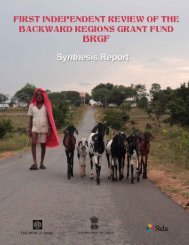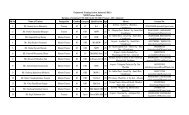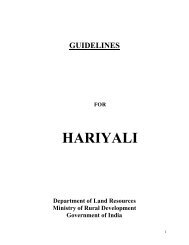contents - National Institute of Rural Development
contents - National Institute of Rural Development
contents - National Institute of Rural Development
You also want an ePaper? Increase the reach of your titles
YUMPU automatically turns print PDFs into web optimized ePapers that Google loves.
Journal <strong>of</strong> <strong>Rural</strong> <strong>Development</strong>, Vol. 31, No. (2) pp. 151 - 162<br />
NIRD, Hyderabad.<br />
INSTITUTIONAL ARRANGEMENTS<br />
FOR FARMLAND DEVELOPMENT :<br />
THE CASE OF ETHIOPIA<br />
ABSTRACT<br />
Abayineh Amare Woldeamanuel*<br />
Fekadu Beyene Kenee**<br />
Land is an asset <strong>of</strong> enormous importance for billions <strong>of</strong> rural dwellers in the<br />
developing world. Increased land access for the poor can also bring direct benefits <strong>of</strong><br />
poverty alleviation, not least by contributing directly to increased household food<br />
security. In countries where agriculture is a main economic activity (e.g. Ethiopia),<br />
access to land is a fundamental means whereby the poor can ensure household food<br />
supplies and generate income. Therefore, this study aimed to sketch-out institutional<br />
arrangements to get access to farmland and to empirically examine institutional<br />
mechanisms to settle dispute arising from contracting farmland in Amigna district.<br />
The result revealed that land rental markets appeared to be the dominant<br />
institutional arrangement to get access to farmland next to Peasant Association<br />
allocated arrangement. This created breathing space for short-term land acquisition<br />
for landless and/or nearly landless farm households. Moreover, the dominant<br />
transactions took place among a neighbour followed by transfers between friends in<br />
the same peasant association, and relatives in the same peasant association. The<br />
foregoing discussion with key informants revealed that such transfers are informal<br />
and there are no formal rules and regulations to enforce land transfers to reduce high<br />
risk that may arise from these transactions. Regarding the mechanisms used by the<br />
sample respondents’ in order to resolve disputes, farmers claimed their rights through<br />
local elders, religious leaders, and local institutions. This may be due to the perception<br />
<strong>of</strong> legal uncertainty over landholdings particularly in the case <strong>of</strong> rental contracts,<br />
which existed informally. Therefore, policy and development interventions should<br />
give emphasis to improvement <strong>of</strong> such institutional arrangements that create venue<br />
for land access.<br />
Introduction<br />
Questions about land markets are central<br />
to development policy, as underlined recently<br />
in 2008 World <strong>Development</strong> Report. The policy<br />
immensely advocates liberal reform that<br />
attempted to fortify private markets (primarily<br />
* Jimma University, College <strong>of</strong> Agriculture and Veterinary Medicine, Department <strong>of</strong> <strong>Rural</strong> <strong>Development</strong>,<br />
P.O. Box. 307 Jimma, Ethiopia.<br />
** College <strong>of</strong> Agriculture and Environmental Sciences, Department <strong>of</strong> <strong>Rural</strong> <strong>Development</strong>, P.O.Box.161,<br />
Haramaya, Ethiopia.<br />
The authors thank Ministry <strong>of</strong> Education for financing the research work, special thanks to Amigna District<br />
Bureau <strong>of</strong> Agriculture and <strong>Rural</strong> <strong>Development</strong> for their generous cooperation during data collection,<br />
also thank Alemayehu Amare who was involved in organising and facilitating data collection in the<br />
household survey. Special thanks go to all households who responded to the questions.


